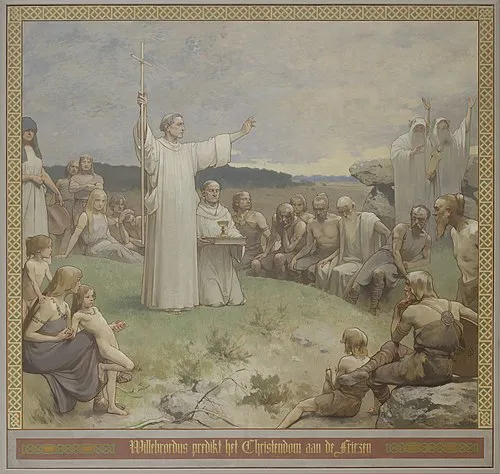
Willibrord: The Apostle to the Frisians
Willibrord, born in 658 AD, is a significant figure in the history of Christian evangelization in Northern Europe, particularly among the Frisians. As a Benedictine monk and missionary from England, he dedicated his life to spreading the Christian faith, leaving a lasting impact on the regions he touched.
Early Life and Education
Willibrord was born in the kingdom of Northumbria, England. At a young age, he joined the monastery at Ripon, where he was educated under the guidance of the abbot, Saint Wilfrid. His strong desire for learning and fervent spirituality led him to seek further education in the monasteries of Ireland, which were renowned for their scholarship and spiritual fervor.
Mission to the Frisians
In 690 AD, inspired by a vision and motivated by his missionary zeal, Willibrord embarked on his mission to the Frisians, a group of people residing in what is now the Netherlands and northern Germany. The region was largely pagan, and Willibrord aimed to convert the Frisians to Christianity.
With the blessing of Pope Sergius I, Willibrord began his evangelization efforts. Unlike many of his contemporaries, who faced violent opposition, Willibrord’s approach was diplomatic and peaceful. He preached and established relationships with local leaders, which helped him in gaining acceptance among the Frisian people.
Establishment of the Diocese of Utrecht
In 695 AD, Willibrord was appointed the first bishop of the newly founded diocese of Utrecht, which marked a significant turning point in his mission. He established churches, schools, and monasteries, effectively laying the foundations for a Christian community. Under his leadership, the diocese grew, and the faith took root deeply among the Frisians.
Willibrord’s diplomatic efforts, paired with his genuine pastoral care, attracted many individuals to embrace Christianity. He even baptized the local king, Radbod, although Radbod’s eventual rejection of the faith posed challenges to Willibrord's mission.
Legacy and Influence
Willibrord's work led to a significant Christian presence in the region, which was further expanded by his successors. His contributions are immortalized in various historical accounts, which highlight his unwavering commitment to evangelization.
Willibrord's efforts paved the way for future missionaries, including Boniface, who would further the mission in Germany and the surrounding regions. Willibrord's legacy is celebrated in both the Catholic Church and the Anglican Communion, with his feast day observed on November 7th.
Conclusion
Willibrord's dedication to spreading Christianity in the Frisia region marks him as a pivotal figure in the history of early medieval Europe. His commitment to non-violence, education, and community building serves as a powerful example for those engaged in missionary work today. Willibrord not only transformed the spiritual landscape of his time but also left an enduring imprint that resonates with the churches that followed.






